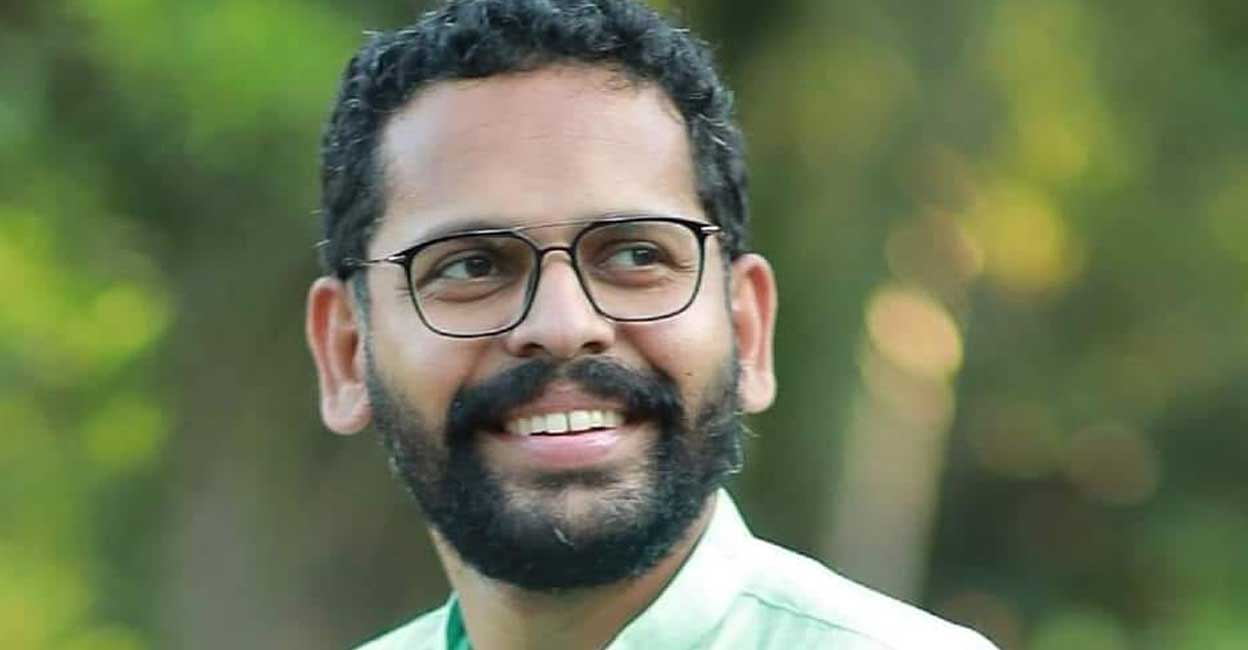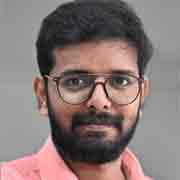Focus on organising Congress’ cyber warriors, says Anil Antony’s successor Sarin | Interview

Mail This Article
Last month when Anil Antony quit as the convener of the Kerala Pradesh Congress Committee’s (KPCC) digital media cell, after putting the party in an embarrassing situation over the BBC documentary on the Gujarat riots, the organisation did not waste any time to find a replacement for him. In a surprising move, the party appointed Dr P Sarin, a young and active face of the Congress on social media, television, and organisational affairs, in his place. A medical graduate, Sarin became active in politics after quitting civil service. He contested the 2021 assembly polls unsuccessfully from Ottappalam constituency.
In an interview with Onmanorama, Sarin says his appointment was already under the party’s consideration and the Anil Antony episode only accelerated it. He is highly critical of the stance taken by Anil, the son of Congress veteran A K Antony, on the BBC documentary – ‘India: The Modi Question’. Echoing the ruling BJP’s views, Anil had questioned the credibility of the documentary which he said challenged the sovereignty of the country.
However, he gives him due credit for mobilising the party’s social media machinery at crucial points. He also talks about the task at his hand, the challenges ahead and the plans to move forward. Read excerpts:
Q: Your appointment as the KPCC digital media convener was not in the usual style. The party was forced to find a replacement for Anil Antony immediately after his controversial resignation. How did the party pick you so quickly?
A: It's not true that my appointment happened quickly. This was under consideration for the past few weeks, even though it would be difficult for people to believe it. My party colleague Rjil Makkutty posted the same on Facebook. Fortunately, it's a document proving my claim. There's a mention of me travelling to Kannur to meet a social media expert from the US. I made that travel as part of the discussions that were going on inside the KPCC for a structural change. That happened three or four days before Anil Antony made his tweet (on the BBC documentary). The talks were very much on, but it was accelerated by the eventualities that happened.

Q: So Anil was already looking for a way out?
Not like that. Anil had his interests in some professional commitments. He is part of several study groups. He is very much interested in academic exchange programmes. For almost the past year, he was busy with such work. He had already expressed willingness to relinquish his post after the new KPCC president (K Sudhakaran) took charge. His resignation would have happened anytime. It's just that KPCC also delayed the restructuring a bit.
Q: Anil’s stand on the BBC film was widely criticised. As his former colleague and successor, what’s your take on the controversy?
My personal, as well as the official, stand on the issue is the same. Anil's statement, connecting the BBC documentary with national interests, was not at all welcoming. One always has the right to express his opinion on a matter, but just because Anil made the statement while holding the office of the digital media convener, it could not be true. Nor could it be interpreted as the party's view. Anil could be the only person in Congress with such a view. He created a situation wherein he made an inopportune opinion on an unwanted issue and it became projected as Congress' stand. Such a situation was unwarranted.
Q: Is it true that Anil was not happy with the party leadership over matters relating to the digital cell, especially its restructuring?
I will not vouch for that. It is also very unlikely. I was a part of Anil's committee. There were only 10 members of the core committee. It is not right to say that the social media team did not get enough support. The leadership was always open to our ideas. At the same time there was some delay in implementing them, provided Congress' organisational style.
Q: You have been a part of the Congress’ digital cell ever since it was formed during the tenure of M M Hassan as PCC chief. What’s the current status of the cell?
I admit that the results of our ranking are not as one would desire them to be, especially if you take statistics of likes, shares, comments and engagement of our official accounts. In the case of setting narratives, we are behind others. Social media is often used for spreading negative campaigns, but Congress has never done that and will not do so. But the distance we have to cover is long. We have to speed up.
Q: The tenure of Anil Antony was crucial. The party suffered setbacks in local body and assembly elections during the period. It was a time the social media team had to be as aggressive as possible. What happened during the period?
The characteristic of a resilient team should be to rebound from setbacks, be it in street politics or social media. Not even a single supporter of us on social media has taken a step back in their campaign. But there was a lapse in coordinating them. It created an impression that our social media presence stagnated. But then Kerala has taken up the narratives set by the new leadership, including K Sudhakaran and Leader of the Opposition V D Satheesan, in issues like anti-K Rail agitation. Take the instance of the Thrikkakara bypoll, who created the buzz in social media there? It was us. We did it amid the so-called crisis period.
Q: Was there a concerted effort behind it?
Yes. We had set up a special team for that and I was part of the war room.
Q: Had Anil carried out a leadership responsibility during the bypoll?
Anil was very much there. No doubt. It's just that since it was a by-election in Ernakulam, people from the district, who knew the ground realities, were assigned the task. Anil had led the campaign properly. We were able to effectively bust the narratives set by CPM's all-powerful cyber team.
Q: You have been assigned a leadership role only recently, but you have been part of the Congress social media team for a long. So you must already have an action plan for the immediate future. Can you share some information on that?
Let me make it clear that it's not an individual-centric plan. We have a strong team, be it on the technical side or content or distribution channel. I'm in touch with all of them. I can say, at least on a small scale, we have been able to organise a sector that had been in disarray within a couple of days (after the new team was appointed). V T Balram has been appointed in the supervisory role, replacing Shashi Tharoor. We have quickly entered into an agenda-setting mode. We strictly believe that our work should have a confidential nature. The results should prove what we are going to do.
Q: Will there be a restructuring of the entire team?
There will be some tweaking and fine-tuning as the situation demands.
Q: What’s the current structure of the digital media cell?
KPCC already has a digital cell. We might decentralise it region-wise. There will be committees at the district level also. There will be virtual teams for Lok Sabha and assembly constituencies. Above all, we will be concentrating on local body levels which have been remaining unattended.
Q: 2024 elections are fast approaching and at the moment the political narrative doesn't look favouring either UDF or LDF in Kerala. How do you plan to set a pro-Congress narrative in the run-up to the polls?
The narrative of any national party should not be based on an imminent election. It should be based on their progressive mindset and continuing agenda of nation-building. Congress is a national movement. Its steam was lost at some point and we are trying to regather that lost team. Bharat Jodo Yatra was part of this. We have to show the people how the politics of love win over the politics of hate. It's not a lesser task to convince the electorate that the most important thing is to keep the democratic and secular ethos of the country intact. For that, we will have to set that narrative into the politics of social media also. For the Lok Sabha elections, we will highlight the work done by our MPs and try to convince the electorate. The specifics I cannot disclose.
Q: Congress has a lot of foot soldiers on social media. Do they keep promoting and defending the party on their own? What's your plan to coordinate them?
We have often put in some effort to channelsise the social media army and we have succeeded and failed at times. Now we don't have to waste. Now our focus will be to amplify the narratives spread by social media handles with good reach. At the same time, they can't be isolated and disorganised narratives. Our focus will be to use the handles to send out unified messages and to expose the claims of the opposing sides. By the end of March, we will have a structure for the dissemination of our messages.
Q: In hindsight, your predecessor Anil seems to have wasted a huge opportunity not only to activate an efficient social media army but also to build up his political career (if he wanted). The head of the social media team of any party has by default the opportunity to interact with all the leaders and more importantly with a wide section of young party workers. How do you look at the opportunity you have been given?
I believe that in politics there should not be a situation wherein you rue a lost opportunity. Anil is someone who could move our team in the Lok Sabha and assembly elections. It's just that there was a break in the efforts. At the same time, we were able to create momentum in organisational and street politics. It's true that social media also should have been used more in these efforts. We will be trying to fix that gap in the coming days.
As a social media convener, I have limitations to reach out to people. But it's important to listen to them. We have to know their concerns over where the party is faring badly on social media. The post also enables one to get to know how the leadership is approaching an issue and give them feedback on how to present them on socials. I'm looking forward to fulfilling the mandate given to me. There will be a concrete direction on which way we have to move forward.


